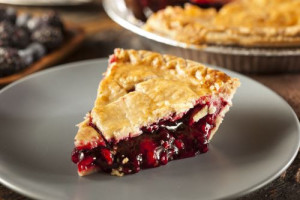Erythritol
Table of Contents
NEWS: This superfood is now available in the SANEStore as a convenient whole-food powder so you can more easily enjoy it in smoothies and recipes.
Erythritol is a polyol which is another name for sugar alcohol (a type of sugar substitute) which has been approved for use in the United States and throughout much of the world. It occurs naturally in mushrooms, fermented foods, and various fruits, such as grapes, melons and pears, and it is also found in supplement form as a crystalline powder.
It was discovered in 1848 by British chemist John Stenhouse but has been part of the human diet for thousands of years due to its presence in fruits and other foods.
It is about 80% as sweet as table sugar yet it is almost non-caloric; does not affect blood sugar, does not cause tooth decay and is absorbed in the small intestine and rapidly eliminated by the body within 24 hours. Laxative side effects sometimes associated with excessive polyol consumption are unlikely when consuming Erythritol.

Erythritol Benefits
Erythritol has antioxidant properties and may help blood vessel function in persons with type 2 diabetes. These benefits might potentially lower the incidence of heart disease, but further research is needed. Poor dental health, cavities, and tooth decay are all associated with abnormally high sugar consumption.
Erythritol Uses
Erythritol is used in the production of certain kinds of hard candies, chocolates, and gums. Like other sugar alcohols (maltitol, xylitol), it can produce a cooling sensation when added to these products.
This sensation helps to give these foods their characteristic tastes. Erythritol has also been used as an artificial sweetener in commercially-produced low calorie foods, including candy and ice cream .
Some manufacturers use erythritol because it is non-cariogenic (does not cause tooth decay).
However, this benefit might be limited to persons with sufficient saliva flow or who brush after eating such products containing erythritol.
As a sugar substitute for diabetics, erythritol has several benefits. Its chemical properties mirror sugar’s in many ways. Sugar-dependent enzymes can break erythritol down into the exact same products as sugar.
For this reason, consumers can substitute erythritol for sugar—to some degree—without any negative effects on taste or texture . This makes it one of the most appealing non-sugar sweeteners for diabetics who miss their sweets.
Erythritol also affects blood glucose levels similarly to sugar . It is rapidly absorbed and transported to the liver where some of it is turned into glucose while some is burned immediately for energy.
The remainder passes through the kidneys un-metabolized and is excreted in the urine. This is the basis for claims that erythritol has a “zero glycemic index” .
Erythritol Side Effects
According to one manufacturer of erythritol, it has no known side effects in adults when taken in amounts less than 100 grams per day—the equivalent of about 2 cups of sugar. Some people find that it causes an increase in stomach gas or diarrhea when consumed in concentrations higher than this amount.
As with other artificial sweeteners , some people may experience headaches or migraines if they are sensitive to its chemical properties . It can cause mild gastric discomfort if consumed in significant quantities (more than 18 ounces).
Why Try Erythritol?
- Clean taste like regular sugar (about 80% as sweet as sugar) without the negative effects
- Does not promote tooth decay
- Zero calorie
- Safe for people with diabetes (0 on the glycemic scale)
- Clean sweet taste with no aftertaste
- Low laxative effect
- Possibly reducing the glycemic impact of a food/beverage, thereby reducing the effects of hyperglycemia-induced free radical formation
- Protecting the cells lining the blood vessels from oxidative stress
References
1. FDA/CFSAN: Agency Response Letter: GRAS Notice No. GRN 000076
2. The discovery of erythritol, which Stenhouse called “erythroglucin”, was announced in: Stenhouse, John (January 1, 1848). “Examination of the proximate principles of some of the lichens”. Philosophical Transactions of the Royal Society of London 138: 63–89; see especially p. 76.
3. Shindou, T., Sasaki, Y., Miki, H., Eguchi, T., Hagiwara, K., Ichikawa, T. (1988). “Determination of erythritol in fermented foods by high performance liquid chromatography”. Shokuhin Eiseigaku Zasshi 29 (6): 419–422.
5. Arrigoni, E.; Brouns, F.; Amadò, R. (Nov 2005). Human gut microbiota does not ferment erythritol.. Br J Nutr 94 (5): 643–6. PMID 16277764.
6. Munro IC, Berndt WO, Borzelleca JF, et al. (December 1998). “Erythritol: an interpretive summary of biochemical, metabolic, toxicological and clinical data”. Food Chem. Toxicol. 36 (12): 1139–74. doi:10.1016/S0278-6915(98)00091-X. PMID 9862657.
7. Storey, D.; Lee, A.; Bornet, F.; Brouns, F. (Mar 2007). “Gastrointestinal tolerance of erythritol and xylitol ingested in a liquid.”. Eur J Clin Nutr 61 (3): 349–54. doi:10.1038/sj.ejcn.1602532. PMID 16988647.
8. Hino, H.; Kasai, S.; Hattori, N.; Kenjo, K. (Mar 2000). “A case of allergic urticaria caused by erythritol.”. J Dermatol 27 (3): 163–5. PMID 10774141.
9. Arrigoni E, Brouns F, Amadò R (November 2005). “Human gut microbiota does not ferment erythritol”. Br. J. Nutr. 94 (5): 643–6. PMID 16277764.
10. Wohlfarth, Christian (2006). CRC handbook of enthalpy data of polymer-solvent systems. CRC/Taylor & Francis. pp. 3–. ISBN 978-0-8493-9361-7.
11. Jasra,R.V.; Ahluwalia, J.C. 1982. Enthalpies of Solution, Partial Molal Heat Capacities and Apparent Molal Volumes of Sugars and Polyols in Water. Journal of Solution Chemistry, 11 ( 5): 325-338. Template:ISSN 1572-8927
12. Kawanabe J, Hirasawa M, Takeuchi T, Oda T, Ikeda T (1992). “Noncariogenicity of erythritol as a substrate”. Caries Res. 26 (5): 358–62. PMID 1468100.









